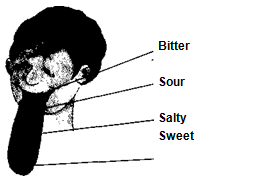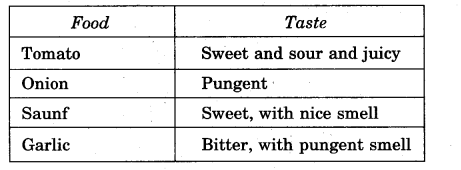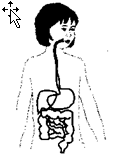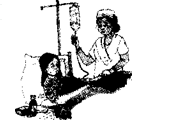NCERT Solutions for Class 5 EVS Chapter 3 From Tasting To Digesting
1. Jhoolan’s mouth started watering when she heard the word imli. When does your mouth water? List five things you like to eat and describe their taste.
Ans. When I see one of my favourite food, my mouth waters. Following are the things which I like to eat.
2.Do you like only one kind of taste or different ones? Why?
Ans. I like different kinds of taste. Only one taste can be boring.
3.Jhoolan put a few drops of lemon juice in Jhumpa’s mouth. Do you think we can make out the taste with just a few drops?
Ans. Yes, a few drops of sour things are enough to make out the taste.
4.If someone were to put a few seeds of saunf (aniseed) on your tongue, would you be able to tell with your eyes closed? How?
Ans. Yes, we can recognise something by taste and smell also.
Best restaurants near me
5.How did Jhumpa make out the fried fish? Can you guess the names of certain things only by their smell, without seeing or tasting them? What are these things?
Ans. Jhumpa made out the fried fish by its smell. Yes, I can guess many things only by their smell. For example; I can guess fish, omlette, samosa, pakodi, etc. by their smell.
6.Has anyone ever told you to hold your nose before taking a medicine? Why do you think they tell you to do this?
Ans. Sense of smell helps in getting the complete taste of a food. In case of medicine, closing the nose, will somewhat mask the taste of medicine. This may be the reason why we are told to close our nose while taking a medicine.
Close Your Eyes and Tell
1.Collect a few food items having different kinds of taste. Play a game with your friends like Jhumpa and Jhoolan did. Tell your friend to taste the food and ask— >- How did it taste? What was the food item?
Ans. The taste was sweet. The food item was sugar.
2.On which part of the tongue could you get the most taste—in front, at the back, on the left or right side of the tongue?
Ans. In front side. (Assuming sugar was given)
3.Which taste could be made out on which part of the tongue? Mark these parts on the picture given.
Ans.
4.One at a time put some things to eat in other parts of your mouth—under the tongue, on the lips, on the roof of the mouth. Did you get any taste there?
Ans. No, I could not get a taste there.
5.Use a clean cloth to wipe the front part of your tongue so that it is dry. Put some sugar or jaggery there. Could you taste anything? Why did this happen?
Ans.No, I could not taste a thing. It is because there was no saliva on the tongue. When the food mixes with saliva, then only we get its taste.
6.Stand in front of a mirror and look closely at your tongue. How does the surface look? Can you see any tiny bumps on the surface?
Ans. The surface of the tongue looks rough. Yes, I can see many tiny bumps on the surface of my tongue.
Tell
1.If someone asks you to describe the taste of amla or cucumber, you might find it difficult to explain. How would you describe the taste of these—tomato, onion, saunf, garlic. Think of words that you know or make up your own words to describe the taste.
Ans.
2.When Jhumpa tasted some of the things, she said “Ssssee, ssseee, ssseee….” What do you think she may have eaten?
Ans. She may have eaten a chilli.
3. Why don’t you make sounds that describe some tastes? From your expressions and sounds ask your friends to guess what you might have eaten.
Ans.
Chew It or Chew It Well:
1. What’s the Difference?
Ans.Try this together in class:
• Each of you take a piece of bread or roti or some cooked rice.
• Put it in your mouth, chew three to four times and swallow it.
2.Did the taste change as you chewed it?
Ans. Not much. It is almost the same.
3.Now take another piece or some rice and chew it twenty to twenty-five times. >- Was there any change in the taste after chewing so many times?
Ans. Yes, there is a change in taste. The food began to taste sweet.
Discuss
1.Has anyone at home told you to eat slowly and to chew well so that the food digests properly? Why do you think they say this?
Ans. Yes, my mother always tells me to eat slowly and to chew well. I think proper chewing is necessary for easier swallowing. It also helps to digest the food.
2.Imagine you are eating something hard like a green guava. What kinds of changes take place in it—from the time you bite a piece and put it in your mouth to when you swallow it? Think what does the saliva in our mouth do?
Ans. When I bite off a piece of guava, it is hard and may taste somewhat bitter. After chewing for some time, it becomes soft and tastes sweet. The saliva makes the food soft and helps in its digestion.
Straight from the Heart
1.Where do you think the food must be going after you put it in your mouth and swallow it? In the picture given here, draw the path of the food through your body. Share your picture with your friends. Do all of you have similar pictures?
Ans. I think the food from mouth goes to the stomach.
Yes, all of us have similar pictures.
Discuss
1.How do you feel when you are very hungry? How would you describe it? For example, sometimes we jokingly say, “I am so hungry I could eat an elephant!”
Ans. When I am hungry, I feel strange sensations in my stomach. I am unable to focus on anything.
2.How do you come to know that you are hungry?
Ans. I get a strong urge to eat something. This is a signal to show that I am hungry.
3.Think what would happen if you do not eat anything for two days?
Ans. If I do not eat a thing for two days; I think I will become weak and may fall sick.
4.Would you be able to manage without drinking water for two days? Where do you think the water that we drink goes?
Ans. No, I will not be able to manage without water for two days. I will not be able to manage even for a day. I think the water is used by our body for various functions. Excess water is removed in the form of urine and sweat.
Talk and Discuss
1.Do you remember that in Class IV you made a solution of sugar and salt? Nitu’s father also made this and gave her. Why do you think this is given to someone who has vomiting and loose motions?
Ans. In case of vomiting and loose motions, the amount of water, salt and sugar decreases in the body. This can be a dangerous situation. Sugar and salt solution is given to replenish this loss.
2.Have you heard the word ‘glucose’, or seen it written anywhere? Where?
Ans. Yes, I have heard the word glucose and have seen it written on the packets of glucose powder. I have also seen many advertisements of glucose on TV and in newspaper.
3.Have you ever tasted glucose? How does it taste? Tell your friends.
Ans. Yes, I have tasted glucose. It tastes sweet.
4.Have you or anyone in your family been given a glucose drop? When and why? Tell the class about it.
Ans. Once, my grandmother had to be admitted to hospital. She was sick. She was given the glucose drip in the hospital. Doctors said that it would help her to recover quickly.
5.Nitu’s teacher used to tell the girls to have glucose while playing hockey. Why do you think she did this?
Ans. Lot of sweating happens when you play outdoor games. This results in loss of water, sugar and salt from the body. This can sap your energy. Glucose solution quickly replenishes lost water and sugar. That is why Nitu’s teacher used to tell the girls to have glucose while they were playing hockey.
6.Look at Nitu’s picture and describe what is happening.How is the glucose drip being given?
Ans. The picture shows glucose drip being given to Nitu.
The glucose solution is in a bottle. A tube and needle is used for supplying glucose to the body.
Think and Discuss
1.Imagine, if you had been in place of Dr. Beaumont, what experiments would you have done to find out the secrets of our stomach? Write about your experiments.
Ans. If, I were in place of Dr. Beaumont, I would have done experiments with boiled rice, chapatti, and salad. It would have taken out digestive juices from Martin’s stomach and would have kept equal amounts of boiled rice, chapatti and salad in different glasses. I would have checked for the time it took to digest a particular food.
Discuss
1.Why do you think Rashmi could eat only one roti in the whole day?
Ans. Rashmi is too poor to afford proper meal. That is why she could eat only one roti in the whole day.
2.Do you think Kailash would like games and sports?
Ans. No, I think Kailash would not like games and sports. His fat and flabby body shows that he hardly does physical activities.
3.What do you understand by ‘proper’ food?
Ans. Adequate and nutritious food according to one’s body needs make the ‘proper’ food.
4.Why do you think that the food of Rashmi and Kailash was not proper?
Ans. Rashmi is not getting adequate amount of food. On the other hand, Kailash is taking too much food than what his body needs. Moreover, he is eating chips, burgers, pizzas and soft drinks; instead of eating home-made food. These are harmful food.
Find Out
1.Talk with your grandparents or elderly people and find out what they ate and what work they did when they were of your age. Now think about yourself— your daily activities and daily diet. Are these similar or different from what your grandparents did and ate?
Ans. My grandparents used to eat rice, dal, green vegetables, milk and lot of fresh fruits. They used to do lot of physical activities. They used to walk two miles to go to school. They used to play games which involved lot of physical activities. The modern times have changed. We do eat rice, dal and vegetables, but we also take many junk food. I go to school by school bus. Major part of my free time is spent sitting on sofa, watching TV or playing computer games. We do less amount of physical activities.
Think and Discuss
1.Do you know any child who does not get enough to eat in the whole day? What are the reasons for this?
Ans. Yes, I know of some children who do not get enough to eat in the whole day. They live in the nearby slum. They are too poor to afford a proper meal in a day.
2.Have you ever seen a godown where a lot of grain has been stored? Where?
Ans. Yes, I have seen lot of grain being stored in the nearby mandi.
What We Have Learnt
1.Why can you not taste food properly when you have a cold?
Ans. We know that the sense of smell helps in getting the complete taste of food. In case of common cold, our nose is blocked, which blocks the sense of smell. That is why we are unable to taste food properly in case of cold.
2.If we were to say that “digestion begins in the mouth”, how would you explain this? Write.
Ans. The salivary glands are present in the mouth. Saliva contains digestive enzymes. The enzyme from saliva helps in breaking complex sugars into simple sugars. Thus, it can be said that digestion begins in the mouth.